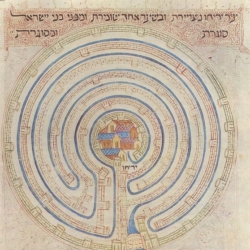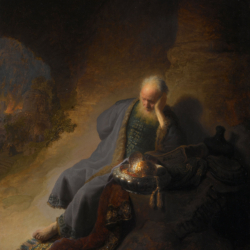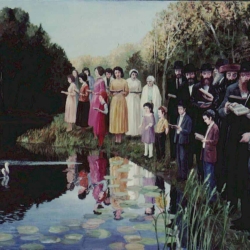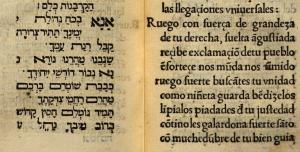| Initials (Hebrew) | Source (Hebrew) | Translation (Spanish) |
|---|---|---|
אב״ג ית״ץ |
אָנָא בְּכֹחַ גְּדוּלַת יְמִינֶךָ תַּתִּיר צְרוּרָה |
Ruego con fuerça de grandeza de tu derecha, suelta angustiada |
קר״ע שט״ן |
קַבֵּל רִנַּת עַמֶךָ שַׂגְּבֵנוּ טַהֲרֵנוּ נוֹרָא |
recibe exclamacion de tu pueblo En fortece nos munda nos timido |
נג״ד יכ״ש |
נָא גִבּוֹר דּוֹרְשֵׁי יִחוּדֶךָ כְּבָבַת שׁוֹמְרֵם |
ruego fuerte buscantes tu unidad como niñeta guarda |
בט״ר צת״ג |
בָּרְכֵם טַהֲרֵם רַחֲמֵי צִדְקָתֶךָ תָּמִיד גּוֹמְלֵם |
bendizelos lipialos piadades de tu justedad contino les galardona fuerte santo |
חק״ב טנ״ע |
חָסִין קָדוֹשׁ בְּרֹב טוּבְךָ נַהֵל עֲדָתֶךָ |
Con muchedumbre de tu bien guia la tu compaña, |
יג״ל פז״ק |
יָחִיד גֵּאֶה לְעַמְּךָ פְנֵה זוֹכְרֵי קְדוּשָׁתֶךָ |
unico altivo a tu pueblo atiede recordantes tu santidad |
שק״ו צי״ת |
שַׁוְעָתֵנוּ קַבֵּל וּשְׁמַע צַעֲקָתֵנוּ יוֹדֵעַ תַּעֲלוּמוֹת׃ |
nostro gemido recibe y oye nostra exclamacion conocie entrinsecos: |
Prepared by Isaac ben Shem Tov Cavallero, “Orden de Oraciones segundo el uso ebrèo en lengua ebraica y vulgar espanol: traduzido por el doctor Isac hijo de Don Semtob cavallero” was the first siddur prepared for use by Sepharadim in Spanish throughout the Spanish-Portuguese diaspora. The earliest attestation of Ana b’Khoaḥ is unknown, but the earliest I have been able to find it is in a re-printing of Israel Cornelius (Cornelio) Adelkind proofread revision of Temunot Tehinot Tefilot Sefarad, a maḥzor first published by Daniel Bomberg in 1519. (The reprinted edition I found was from 1544. According to the scholar, H.P. Salomon, z”l, that edition is unchanged from Adelkind’s 1523 revision.[1] This detail is mentioned by Salomon in “A fifteenth century haggada with ritual prescriptions in portuguese aljamiado.” Arquivos do Centro Cultural Português. vol. 15 (1980), p. 225. )
Ana b’Khoaḥ almost certainly dates from before this printing, but we simply don’t know. This is the earliest printing we have located it in (so far). If you know of an earlier example of Ana b’Khoaḥ in print or manuscript, please leave a comment or contact us.
For other examples of the 42 letter divine name sequence, find the litany of angel names in Sefer HaQanah and in Sefer haPeliah. Connected to the latter is another 42 letter divine name acrostic piyyut, “Elohim B’Yisrael.” There are also two other piyyutim directly concerned with the ascent of the soul of one on their deathbed; one recorded by Isaiah Horowitz in his Shnei Luḥot Habrit, and another provided in the Sefer Ma’avar Yabbok with prayers for the Ḥevre Kaddishe.
We are grateful to Aron Sterk for proofreading our transcription. He notes: “The accents are random and the ç before e and i are unnecessary…They are just typographic tics.” The transcription above expands the abbreviations (e.g. “con” for “co”) and swaps consonantal u for v and vice versa. –Aharon Varady
Source


Notes
| 1 | This detail is mentioned by Salomon in “A fifteenth century haggada with ritual prescriptions in portuguese aljamiado.” Arquivos do Centro Cultural Português. vol. 15 (1980), p. 225. |
|---|

“אָנָּא בְּכֹחַ | Ana b’Khoaḥ, with Spanish translation by Rabbi Isaac ben Shem Tov Cavallero (1552)” is shared through the Open Siddur Project with a Creative Commons Public Domain Dedication 1.0 Universal license.









Io poedo meldar i eskrivir tekstos en ladino i en rashid si vos entereza para laborar kon vozotros esta seriya uma grande onra i felisida kumplida.
Yes, please and thank you!
Are there text you would you be interested in transcribing and translating? Or, would you welcome us sending you texts to be transcribed and/or translated?
Also, please let us know if conversing in English is possible.